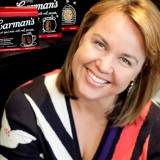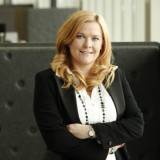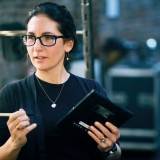Pip Marlow, Managing Director Microsoft Australia talks to Leaders in Heels Editor Rashida, about how she ended up in IT and the importance of taking risks in your career.
Q. How did your career start?
My career in IT began when I started working for a small reseller doing administration work. I really got passionate about IT as a career when I went to work for Samsung. Samsung is an incredibly diverse company but when I started to see how quickly they were able to drive innovation and how quickly products changed – I thought that’s pretty cool. That’s when I really thought that this was the path for me.
Q. Tell us about your journey to the top and a defining career highlight?
It’s been an interesting journey. I spent a couple of years at Samsung and then went to work for a start-up. There were only three people at the beginning which then grew to be a hundred. That was one of the first defining moments for me, by learning to take a risk by getting involved in a start-up. When you don’t know when the next paycheck is going to come, and how well things are going to do. It really taught me to be confident in taking a risk and I’ve applied that learning throughout my career.
I came to Microsoft 17 years ago. I started in 1995, the year of Windows 95 and spent 2 years in Australia, 8 years in the US and 7 years back here in Australia. I had a couple of defining moments in that experience too. First, I was very very lucky that when pregnant with my first child, I got offered quite a substantial promotion. It really showcased that I was working in an organisation where they are really committed to diversity and taking a bet on me halfway through my pregnancy knowing I was going off on maternity leave. This fully demonstrated that you have to take a bet on people and I was very grateful for that. I try and do the same for people around me. Working at Microsoft as such a forward organisation has been a great experience. I had a lot of different roles in the company and it taught me to really have an appreciation for a lot of different seats there are across the business and really seek to understand the different parts to get an appreciation for the whole and that’s something that’s really helped me in my current role.
Q. How would you describe your leadership style?
I would say it’s participative although that’s not consensus for me. I believe in the wisdom of crowd and also in driving high levels of participation and engagement from the organisation and my leadership team. Through diverse thinking and the power of group, I think you can get to a better outcome than one or two people by themselves. I’m high on driving accountability, and I love to take bets and set their goals. I also like to have a little bit of fun. We spend a lot of time in the workforce and a lot of time together as a team. I think people want to enjoy what they do.
Q. Where do you see yourself in 20 years?
I would like to be impacting in 20 years as I have a real passion around education. I think education is the one thing that can right-size the lottery of birth. I think if we can help people in disadvantaged communities, if you can up-skill and help those people, they can really change the course not just for those individuals but actually for Australia. If we think about our productivity challenges then I think that’s something that’s just an incredible opportunity for us to make a difference, not just for individuals but for the community and country. I currently spend some time on two not-for-profit boards who are focused in the education sector and helping in disadvantaged communities. I would like to be more solely focused on that in 20 years’ time.
Q. What advice would you give to a person starting their career in the same industry?
If I were writing a letter to my 20 year old self what would I tell myself? I would say I’d get myself in mind to back myself, believe in yourself and back yourself. Sometimes I see a younger woman being a little bit more cautious. You have to believe in yourself and back yourself. I would tell myself that I’m going to make some incredible friendships and business relationships along the way and to nurture those and treat them really well. People are to me at the heart of all we do and so we would think about that aspect of how you’re going to be working and living your life. And I would also say don’t be afraid of change. The only thing constant is change in this industry. Don’t fear it, embrace it. Don’t fear change, embrace it. Change is the only thing that’s constant
Q. What challenges are faced currently for women in the technology industry?
The benchmark in Australia is women in IT is 23% based on the last research I looked at. Obviously that’s not representative of the population pool which is 50% or 51% of the population pool. Women are also 53% of university graduates. So I believe there are things that are still impacting a woman’s ability to either enter this industry or to rise to the top. One of the things I would say is does the glass ceiling exist? Probably there is some resistance, but I would probably say focus more on the sticky floor and not the glass ceiling and think about what are you doing to hold yourself back?
That’s the advice I gave myself 20 years ago – back yourself to take control of your destiny. Do active career planning and aspire, find some people to challenge you and help you because sometimes people don’t challenge themselves enough or aspire high enough. We set our own internal barriers so you’ve got to find people to help as sponsors or mentors. Candidly speaking, there is unconscious bias still existing, and organisations need to do more work to help all the unconscious bias. Assuming that the housekeeping is in order, that there is good maternity leave, good programs in most places to do that but I think you’ve got to go above and beyond.
Q. What is a typical day like for you?
I don’t have a typical day…that’s one of the great things about being in Microsoft and the way we work. We use activity-based working which means I can work anywhere to complete the activity I need. Some days I may choose to work from home, some days I may choose to be at my kids’ schools and take some calls. All I try and do is spend my day externally focused. Spending as much time with our customers and partners is a priority for me as is spending time with our employees, understanding what’s going on at the front line and how I can help them, that’s where I try and keep my focus.
Q. The best part of your job is…
Where I see the impact our people and technology have made on a business, on a person, on a community, on a school when everything just lines up beautifully .I can see where we have helped a customer with their problem, helped teachers with their kids’ learning, see them actually come to life is just brilliant and when I get to see that I get incredibly proud of our people and our technology.
Q. How do you maintain work-life balance?
With a great deal of focus! I don’t really use the term balance now because it’s work-life integration for me. That means there is going to be some times where I’m going to be a mum. For example, last year during school close, my daughter was in Year 6. I wanted to go to the graduation ceremony, that meant during the middle of the day I was at school, but in the evening I’d be working.
That integration of my work and lifestyle is important but it takes focus and planning. I do plan well in advance to make sure I meet the personal commitments that are important to me and my family. I do try and be transparent about those commitments to the organisation. People can look into my calendar and see that I’m at a school function. I try and role model and be transparent to the organisation. I also make sure I’m not beating myself up on any particular day for missing one or two things but really saying “This quarter was I a good enough wife, mother and team manager'” and having the right perspective on that.
Q. What did you think of the recent EOWA statistics?
I think it’s disappointing that despite the conversation that’s in the press on the topic,we are not seeing the conversation and the awareness drive change at a rate that I think is acceptable. It continues to disappoint me that despite that focus we are not driving change which leads to the question, what do we have to do? What is needed in order to see greater representation? Gender diversity is just one element of diversity, there’s age, race, religion so driving diversity not just gender is really important.
We are a multicultural country, one in four Australians is born overseas and we should start to see that reflected in the executive levels and in the boardrooms. Other countries have gone for quotas, Australia hasn’t. We do have to deal with firstly unconscious bias and secondly how to help people uncover merit otherwise we are not going to be able to make the change we need to make.
Away from work…
Q. What is currently lying on your bedside table?
My new ‘Surface ’ that we just gave to every Microsoft employee, which is a new device we have just launched. I’m playing with that on the side of my bed right now so that’s a lot of fun. I’ve also just downloaded the first of Game of Thrones
’ that we just gave to every Microsoft employee, which is a new device we have just launched. I’m playing with that on the side of my bed right now so that’s a lot of fun. I’ve also just downloaded the first of Game of Thrones book so I’m just about to start reading it.
book so I’m just about to start reading it.
Q. What item is always in your bag?
My telephone, lip block and hand sanitiser.
Q. What couldn’t you leave home without?
I’m pretty closely connected to my telephone so it goes everywhere with me and a pair of comfy shoes.
Q. Who is your favourite designer or fashion brand?
I love Diane von Furstenberg because her dresses are so comfortable and versatile, and usually my choice at a school function or a corporate function. My favourite shopping website is birdsnest.com.au and they’ve got some great Australian designers on them.




